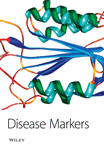TMEM25 Is a Candidate Biomarker Methylated and Down-Regulated in Colorectal Cancer
Abstract
The identification of novel genes involved in colorectal cancerogenesis is of high clinical relevance for early diagnosis, applying new therapeutic strategies and monitoring disease recurrence, in order to reduce disease incidence and mortality. Gene silencing through CpG island hypermethylation is a major epigenetic mechanism involved in cancer development. In our study, we aimed to identify and validate novel genes with a tumour specific DNA methylation profile in colorectal cancer. We performed a whole-genome methylation scan and identified several possible candidate genes that are hypermethylated in tumour in comparison to healthy colon mucosa. Using methylation-specific high-resolution melting analysis in a set consisting of 133 colorectal cancer samples, we were able to confirm an altered CpG site in TMEM25 in 69.2% (92/133) tumours analysed. Furthermore, the expression of TMEM25 was found to be significantly lower in tumour tissue. An inverse correlation between hypermethylation of TMEM25 and TMEM25 down-regulated expression was observed.
Our results suggest that epigenetic down-regulation of TMEM25 is cancer-related; we thus suggest that TMEM25 hypermethylation might play a significant role in altering expression of this gene in colorectal cancer.




